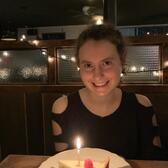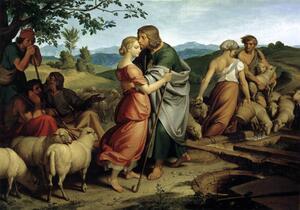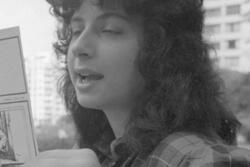Hannah's Ghost
I love Hanukkah. Always have. Eight crazy nights of games, presents, impromptu dance parties to the songs of Jewish musical maestro Paul Zim, and examinations of a stack of illustrated children’s books about the holiday, among them one very special giant-sized coloring book. (When I tell you giant-sized, I mean the length and width of an average toddler.) The coloring book, which had belonged to my mom when she was kid, documented the tale of Judah Maccabee’s triumphant insurrection against the Greeks. I certainly liked to look at the pictures, filled with groovy seventies-inflected debauchery, but I always lingered over one image more than the rest: A woman in a flowing robe sitting on the floor of an empty dining room, broken swords at her feet, a single tear falling down her face. The text to the left of the picture informed me that the woman’s name was Hannah. She was crying because all of her seven sons had just been killed for resisting a Greek attempt to force them to eat pork.
Among ancient Jewish tales, the story of Hannah and her seven sons is not widely known. I myself only heard her story again once, years later, in my Jewish school. But the image of the gently weeping woman stayed with me. Though women are definitely a part of Jewish tradition, their actions and emotions rarely seem to be acknowledged. There are a few—Rebecca, Miriam, the biblical Judge Deborah, the Talmudic sage Bruriah—who are occasionally given top billing, but they always seem to be exceptions to the rule. These women are noted explicitly for their enormous audacity, and for the rebellious paths they pursue in the name of their God and their people. Hannah is an altogether different sort of heroine. She is praised for letting her sons become martyrs. She is praised not for her action, but for her inaction.
Hannah resonates with me in a way I find both inspiring and disturbing. Like Hannah, I am not a rebel. People have told me that I am “laid back” and “easy to be around.” I “go with the flow.” I used to see these descriptions as compliments, but as I grow older and more aware of the wrongs surrounding me, I am afraid that my characteristics mean something else: idle, lazy, or bland. It moves me that the rabbis paid attention to the experience and pain of a single woman. They do not regard Hannah simply as a victim but as a model of noble sacrifice. But I do not want to be like Hannah. I want to defy the Great Man narrative history—in which the story of humanity is just one great man after another changing the world—in a way where I do not have to lose my family, my friends, or myself. If I am to go down in the history books, I want to be there for my triumph, and not my tragedy. That is possible. Right?
To change the world, we will have to change the way we actually view “changing the world.” So this Hanukkah, I will not be celebrating Judah Maccabee. Instead, I will be thinking of Hannah, and all the women who are crowded into footnotes and forgotten to make room for “the interesting stuff.” These women are not just ghostly waifs, cooking meals, washing laundry, and bearing children. They are warriors, teachers, and movers of history, and they deserve to be remembered. I will read their stories, write them down, and tell them to my family and friends. You see, I don’t want to color outside the lines. I want to redraw them.
This piece was written as part of JWA’s Rising Voices Fellowship.








Great piece - thank you.